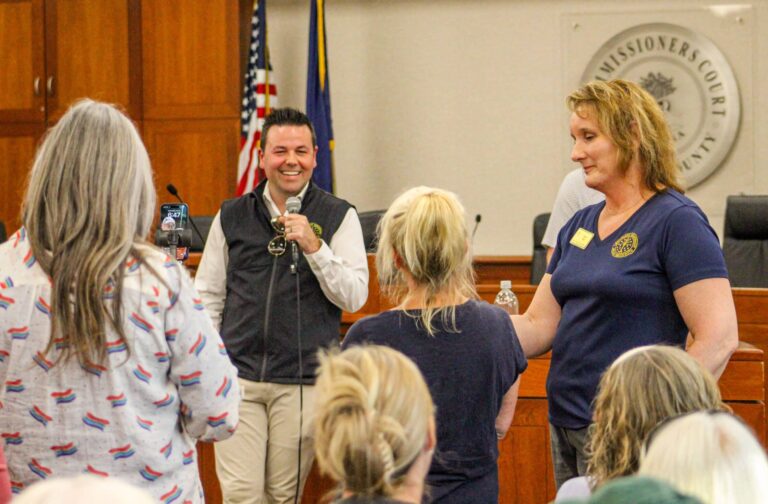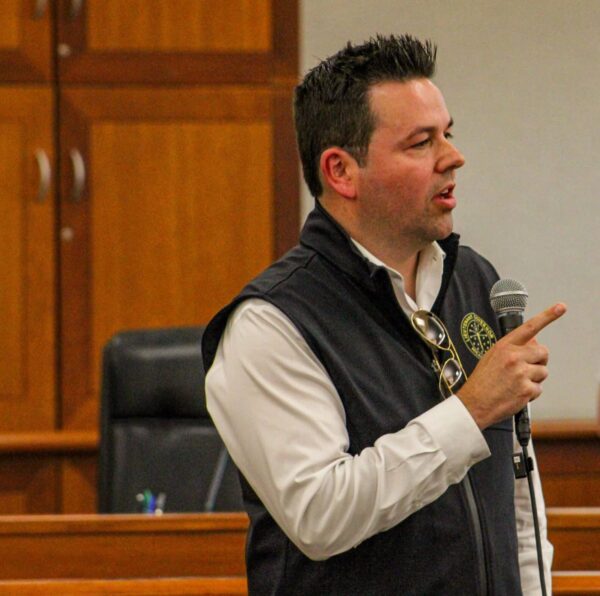
By Sydney Byerly
The Indiana Citizen
August 8, 2025
Pressing the elevator button after leaving the small, third-story conference room in Marion City Hall, Lois Jones hummed a tune and reflected on what she called a productive conversation.
Jones had just wrapped up a meeting with staffers for Indiana Lt. Gov. Micah Beckwith during a “mobile office hours” event on July 16. She came with a list of issues to raise — including a request that the Bureau of Motor Vehicles begin issuing all photo IDs in full color — and said she left feeling heard.
In his seven months as lieutenant governor, Beckwith and his staff have sought to visit all 92 of Indiana’s counties – hitting about 20 counties so far by The Indiana Citizen’s count. Beckwith has hosted at least eight town halls since the end of Indiana’s legislative session in April, where he has at times taken pointed questions. His staff also holds what it calls mobile office hours, where Beckwith’s aides field complaints and, at times, tag the lieutenant governor in by phone to address specific issues.
The statewide outreach comes as Beckwith, the self-identified Christian nationalist and conservative firebrand whose insurgent campaign for lieutenant governor toppled Gov. Mike Braun’s preferred candidate at the state GOP convention last year, faces controversy at the Statehouse, including turnover and scrutiny of his staff’s actions, a terse relationship with Braun, political headaches over social media posts and more.
Still, with other statewide officials under fire over their refusal to hold town halls or face the public, Beckwith is building his political brand outside the Capitol – and receiving credit for it, from constituents and even some Democrats.
“How do they know what you want or need if they don’t hear from you?” Jones said. “And if they’re not doing what you want, guess what — you’ve got the power of the vote.”
Jones said she always tries to attend events like the Beckwith staffers’ mobile office hours when they come up, recalling speaking with staff for former Govs. Mitch Daniels and Eric Holcomb over the years.
“Come here and say, ‘Tell me what’s wrong.’ Don’t try to be superior,” Jones said. I don’t want to meet a superior person. I just want to meet the person who’s going to answer my questions. You can’t answer them questions — don’t come.”
Across the political spectrum, Hoosiers are expressing similar appreciation for the lieutenant governor’s approach — even when they disagree with his policies.
After a town hall in Muncie, William Kory Amyx, a Democratic candidate for Indiana’s 5th District U.S. House seat, posted on social media: “We may not see eye to eye on every issue, Mr. Beckwith — but credit where it’s due: you gave me the mic, let me ask the hard questions, and we kept it civil… That shouldn’t be rare, but in today’s climate, it is.”
He added: “Tonight proved what I’ve said from the start: we can challenge each other without vilifying each other. That’s the Indiana way.”
At a town hall in Warsaw on July 2, Don Zolman, a farmer, publicly thanked Beckwith for his openness.
“You had the courage to come here and take questions from people,” he said.

For Beckwith’s staff, the mission is simple: help people who feel stuck.
The office fields a wide range of issues, from BMV complications to military families struggling to renew licenses. And while not every concern can be resolved on the spot, staff say they work hard to either fix the issue directly or connect constituents with someone who can.
“Sometimes people don’t even know where to start or what agency to go to,” said Jacob Buehrer, an intern with the lieutenant governor’s office. “We get them pointed in the right direction and we follow up.”
The initiative builds on a model used in congressional outreach, adapted to the state level by staff with experience in federal constituent services. And while Beckwith doesn’t attend most mobile events himself, aides said he is easy to reach.
“If we tell him someone needs to hear from him directly, he’ll pick up the phone,” said Kristi Risk, Beckwith’s director of constituent affairs. “He’s very hands-on and trusts our judgment.”
Staffers said that sometimes the lieutenant governor initiates contact, texting team members when he hears about successful interactions or glowing feedback from residents.
Attendance at mobile office hours varies. Some counties see full rooms; others just a few visitors. But staff say they remain busy regardless.
“Even if only one or two people show up, we’ve still got work to do,” said Anthony Simons, Beckwith’s public affairs director. “We also hear from local officials who need help connecting with state departments — we’re a resource for them too.”
To help spread the word, Beckwith’s staff partners with local officials, asking mayors, county commissioners, and council members to share event details with their constituents. In rural counties, his aides rely on local newspapers to reach residents who may not have internet access or use social media.
Beckwith’s staff has hosted events in dozens of counties so far, with upcoming stops scheduled in Pulaski, Scott, Wayne and Bartholomew counties.
“We want people to feel like they don’t need to shout to be heard,” Risk said. “This is about access, plain and simple.”
In a political climate where many elected officials are seen as increasingly out of reach, Beckwith has made direct engagement with Hoosiers a hallmark of his early months in office. From town halls to mobile office hours, Beckwith and his staff have emphasized face-to-face interaction—oftentimes in areas where his positions can be unpopular. His approach stands in contrast to several other Indiana officials who have drawn criticism for their limited public availability.
For Beckwith, even the most contentious gatherings, he says, are part of the job.
“I thought it was amazing,” Beckwith told FOX59 after the contentious Franklin town hall in April. “A passionate room. I think this is exactly what needs to happen in our republic, is coming out and hearing the concerns that people have.”
Events attended by Beckwith and his staff come amid complaints that other statewide elected officials are difficult to reach. In March, the Indiana Capital Chronicle reported on how several of the state’s public officials were facing scrutiny from Hoosiers for not holding or attending town halls.
Earlier this year, U.S. Sens. Jim Banks and Todd Young, along with Reps. Mark Messmer and Marlin Stutzman, were all called out for their lack of town hall appearances. Banks, in particular, sparked backlash for skipping a constituent-led “Empty Chair Town Hall” and instead sending donuts, a move that critics called dismissive.
Even as protests over his comments about the Three-Fifths Compromise cropped up outside, Beckwith continued to show up, saying he appreciates the number of passionate folks who attend the events. He said after the May Elletsville town hall that he likes when people throw tough questions at him.
“I get really tired of being in an echo chamber,” Beckwith said. “I’m gonna tell you right now, you guys are not that.”
He also said on X after the event: “Most Republicans are afraid to go to Monroe County because it often votes blue. However, as Lt. Governor, I serve all Hoosiers, not just the ones that voted for me or agree with me on the issues.”
Sydney Byerly is a political reporter who grew up in New Albany, Indiana. Before joining The Citizen, Sydney reported news for TheStatehouseFile.com and most recently managed and edited The Corydon Democrat & Clarion News in southern Indiana. She earned her bachelor’s in journalism at Franklin College’s Pulliam School of Journalism (‘Sco Griz!).
The Indiana Citizen is a nonpartisan, nonprofit platform dedicated to increasing the number of informed and engaged Hoosier citizens. We are operated by the Indiana Citizen Education Foundation, Inc., a 501(c)(3) public charity. For questions about the story, contact Marilyn Odendahl at marilyn.odendahl@indianacitizen.org.